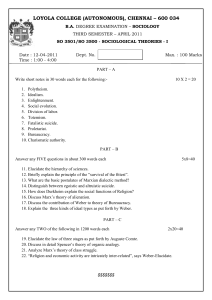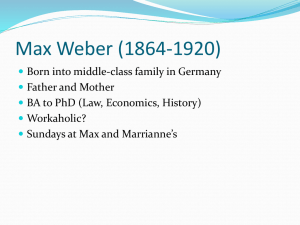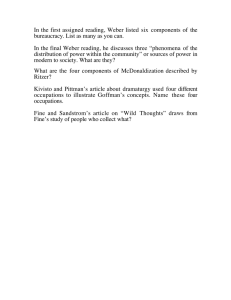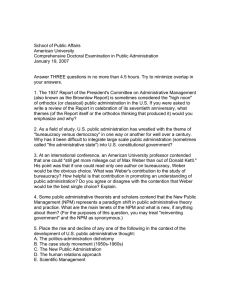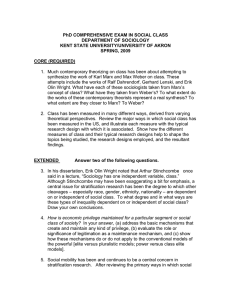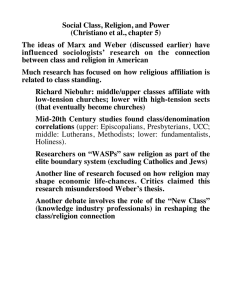Max Weber Vanessa Contreras & Wesley Hammers (1864-1920)
advertisement
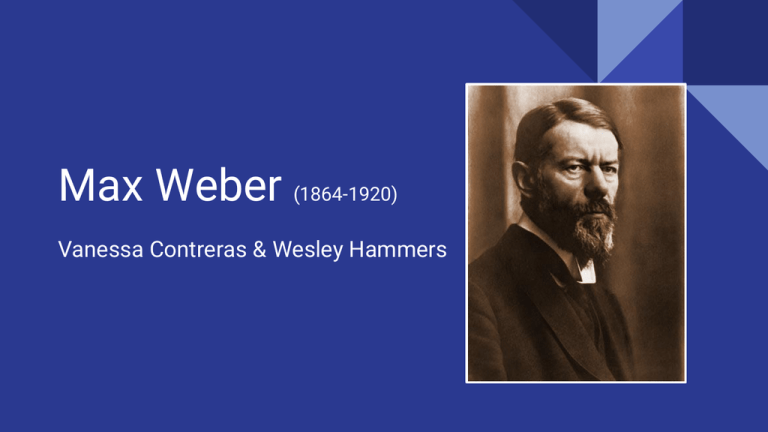
Max Weber (1864-1920) Vanessa Contreras & Wesley Hammers Background Max Weber was . . . ❏ Born on April 21, 1864 in Erfurt, Germany ❏ Son of Helene and Max Weber ❏ The eldest of his 7 siblings ❏ 6 of 8 reached adulthood ❏ As a child, Weber had many medical issues. ❏ Carried on throughout his life 2 Background ❏ The Webers were a family of industrialists and civil servants ❏ They had a considerable amount of political and social connections ❏ Weber's mother was very religious ❏ Weber’s father was active in both politics and his social life ❏ Caused tension between his marriage ❏ He was a lawyer ❏ Although VERY politically active, he enjoyed leisure. ❏ Max enjoyed his father’s ways 3 Background ❏ While Max was in school, he was often times complained about by his teachers. ❏ Lack of respect to their authority and lack of discipline ❏ Age 14, Max was an avid reader and was writing educational essays ❏ Age 18, enrolled at the University of Heidelberg. ❏ He was prepared although shy and thin → Joined father’s dueling frat 4 Background ❏ Joined the military ❏ Influenced by his aunt and uncle while in the military ❏ 2nd set of parents → Helped shape path to future ❏ His aunt was able to interest Max in religion ❏ Slowly began to appreciate his mother more and started viewing his father as a amoral hedonist. ❏ Max became engaged.. For six years.. To his cousin ❏ Completed military service and went back home in 1884. (8 years) 5 Background ❏ 1893: Married Marianne Schnitger (A cousin on his father’s side) ❏ Adopted his sister’s four children ❏ 1897: Parents had a major fight ❏ Max sided with his mother ❏ Kicked father out ❏ Father died a month later ❏ Had serious effects on Max ❏ Very ill; insomnia, nervous breakdowns, psychological problems 6 Intellectual Influences Marx was a man who was always trying to learn something new.. ● He was influenced by multiple people ○ August Comte ○ Nietzsche and Marx ○ Kant and the Neo-Kantians 7 Nietzsche and Marx ● Weber believed that material and ideal interests directly govern individual conduct. ○ He focused more on ideas than the two BUT ● Weber was affected by Marx’s notion that ideas were expressions of public interests and served as weapons in the struggle of classes and parties ● Marx and Weber agree about alienation ■ The negative side of rationalization, was not limited to capitalistic social systems, and instead would be found in all social systems including socialism. 8 Nietzsche and Marx continued... ● Marx believed economic order was determined on class struggle ○ Owners vs. workers ● Weber disagrees saying political ‘power’ and military also affect relationships ○ Wealth, Power, & Prestige ● Marx influenced his materialistic orientation ● Nietzsche inspired Weber’s personal ethic of heroic stoicism. 9 August Comte ● French sociologist ● Coined the term “sociology” ● Believed in “Hierarchy of Sciences” ○ What is Hierarchy of Sciences? ■ Each science is dependent upon the other ● (easiest to complex: astronomy, physics, chemistry, biology, and sociology) ○ Sciences on top borrow from ones below ● Believed there was one science of society with other natural sciences 10 Kant and the Neo-Kantians Neo-Kantianism: A broad cultural movement focused on intellectual critique of: ● Positivism ● Naturalism ● Materialism ● Weber believed that reality is not reducible to a system of laws. ○ No laws can exhaust a science or culture 11 Concepts and Contributions Way to understand and study the world→ V E R S T E H E N ← German word for “Understanding” ● Who had the upper advantage at understanding phenomenas? ○ Sociologists or Natural Scientists? ● Weber believed sociologists need to focus on the actions of individuals ■ And examine the meanings attached to the behaviors (i.e., understanding why someone did or said something—what meanings did they attach to it?) ● Interested in action and meaning: How people give meaning to their actions. ● Sociology is a science concerning itself with the interpretive understanding of 12 SOCIAL ACTION ● Who views society as external structures that function apart from human purpose and will? ● Durkheim ● Weber, however, envisioned the society as the study of social action among humans. ● Meaningful and purposive behavior ● Social acts are created by the actor ● I.e., construction worker whistles at lady walking by (active action) no response (nonactive action) 13 4 Major Types of Social Action Rational Reason or logic as to why someone does something. 1. Zweckrational: An action in which the means to attain a particular goal are ‘rationally’ chosen. 2. Wertrational: Striving for a goal which in itself may not be rational , but is pursued through rational means. 3. Affective Action: Centers around emotional state of the person. (choosing a college) 4. Traditional Action: Customary habits of thought (College: Traditional-Never Questioned) ● Main Point: Purposive rationality is viewed as fundamental for social action. 14 Ideal Types: Wanted to understand complex historical institutions: What made them successful/unsuccessful? Ideal Type: Provides the basic method for historical-comparative study. ● Serves as a measuring rod for social observers to determine the extent to which concrete social institutions are similar and how they differ from some defined measure “Idea Capitalism” - Four features 1. Private Ownership 2. Pursuit of Profit 3. Competition 15 Bureaucracy Bureaucracies: goal oriented organizations guided by rational principles in order to maintain efficiency. Offices are ranked in hierarchical order and the operations of the organization are characterized by impersonal rules Weber’s Model of Bureaucracy Those that relate to the structure and function of the organization Those that deal with means of rewarding effort Those that deal with protections for the individuals 16 Bureaucracy Weber viewed bureaucracy as a necessity in a rational society, however was not necessarily a fan of it Dysfunctions of Bureaucracy It excludes emotion and personal involvement in favor of rational decision-making It has led to depersonalization of the modern world Iron-Cage A symbol of the social pressure we feel from others and ourselves to act in a way that is strategically beneficial to usage People become “trapped” by their own creations (i.e. getting ahead in one’s career 17 Causality Causality: the probability that an event will be followed or accompanied by another event Sociologists should report the reasons and meanings behind the actions taken by people instead of simply recording events “Weber argued that social scientists, unlike natural scientists, must take into account the meanings that actors attribute to their interactions when considering causality” 18 Types of Authority Power: the ability to impose one’s will onto another, even when the other objects Authority: power that is exercised with the consent of the ruled Weber was interested in why men and women feel the need to claim authority over others Also, why people give obedience to authority figures His interest in the structures of authority were influenced by his by political aspirations Weber had intellectual interests similar to Marx and was referred to as “bourgeois Marx” 19 The Protestant Ethic and the Spirit of Capitalism 20 Social Theory Social theory: framework of empirical evidence used to study and interpret social phenomena by social scientists Weber’s studies and insights helped create the following social theories: Structural functionalism: explains why society functions the way it does by focusing on the relationships between the various social institutions that make up society Conflict Theory: suggests that human behavior in social contexts results from conflicts between competing groups Symbolic interactionism: suggests people interact with one another using symbols, and those symbols form meaning. (i.e. words, emoticons) 21 Test Questions Define these terms as they are used by Weber: bureaucracy, iron-cage, verstehen, rationalization, formal and substantive rationality. Describe the Protestant Ethic. a. Cultural barriers, especially ones based on religion, slowed the growth of ration economy system. Describe the key perspective by which Max Weber views society. According to Max, religion and class are the main factors that influence society. b. Inequality is not a factor of who owns the means of production and who does not c. Instead, inequality arises from class, status, and power. a. What do sociologists gain by viewing society from the perspective of Weber? a. Weber created the German Association for Sociology in 1909. He formed the starting point for the careers of many major sociologists of the mid- and late-twentieth century b. Weber’s ideas on social class and inequality continue to assist sociologists today Describe one key limitation to the way that Max Weber views society. a. Bureaucracy, although good, has its limitations. It excludes emotional and personal involvement in rational decision-making. 22
